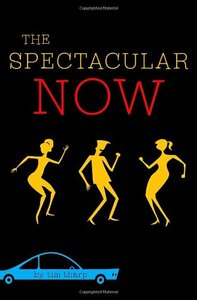You need to sign in or sign up before continuing.
Take a photo of a barcode or cover
3.8 rating lol. this book was cliché but I liked the personality of Sutter and how he lives his life. Its amusing. The characters were good even tho Sutter was the main focus throughout the whole book. Nice book
emotional
funny
lighthearted
relaxing
fast-paced
Plot or Character Driven:
Character
Strong character development:
Complicated
Loveable characters:
Yes
Diverse cast of characters:
No
Flaws of characters a main focus:
Yes
this is one of those books that i only planned on reading because i wanted to watch the movie… almost a decade later i finally read it 🫣 and it was honestly a pleasant surprise!! (even a decade later!)
this book follows Sutter, a senior in high school that’s definitely an alcoholic, lives life to the fullest with any regard for consequences, and is just here to enjoy the “spectacular now” (omg that’s the title of the book woahhhh). it’s a typical coming-of-age story, but more specifically is about Sutter trying to get his newly ex girlfriend, Cassidy back. in the midst of that he also decides to help local loner Aimee in breaking out of her shell and living life away from her controlling family. in his quest to help Aimee, she ends up falling in love with him, and not wanting to hurt her (and rationalizing it in this weird, helping her gain world experience kinda way), he agrees to be her boyfriend and all that.
all in all, Sutter is a terrible influence on Aimee. she used to be a really good and innocent student, but now she’s flunking class, slacking on college, and breaking all of the time. the book is told solely through Sutter’s POV, so we don’t get to see the full scope of his influence on Aimee and those around him, but through Sutter’s friends and Cassidy, we see how hard he’s spiraling and how much he’s affecting Aimee.
Sutter himself doesn’t experience a lot of character growth, mainly bc he’s clouded by his own narcissism, but we do see inklings of him trying to be better, but not ever fully taking hold of himself. this and the ambiguous ending is probably the least satisfying part of the book. while i don’t personally enjoy that part, it’s pretty clear that it’s purposefully don’t like that to symbolize that not everyone gets a happy ending, and life is a little too complicated to give everything a clear cut answer. while i can appreciate that message, i think it would’ve been nice to at least get some sort of confirmation that Sutter continues to better himself or some sort of conclusion on the Aimee storyline.
other than that, it was a super fun and light hearted read. now i gotta watch the movie 😳
this book follows Sutter, a senior in high school that’s definitely an alcoholic, lives life to the fullest with any regard for consequences, and is just here to enjoy the “spectacular now” (omg that’s the title of the book woahhhh). it’s a typical coming-of-age story, but more specifically is about Sutter trying to get his newly ex girlfriend, Cassidy back. in the midst of that he also decides to help local loner Aimee in breaking out of her shell and living life away from her controlling family. in his quest to help Aimee, she ends up falling in love with him, and not wanting to hurt her (and rationalizing it in this weird, helping her gain world experience kinda way), he agrees to be her boyfriend and all that.
all in all, Sutter is a terrible influence on Aimee. she used to be a really good and innocent student, but now she’s flunking class, slacking on college, and breaking all of the time. the book is told solely through Sutter’s POV, so we don’t get to see the full scope of his influence on Aimee and those around him, but through Sutter’s friends and Cassidy, we see how hard he’s spiraling and how much he’s affecting Aimee.
Sutter himself doesn’t experience a lot of character growth, mainly bc he’s clouded by his own narcissism, but we do see inklings of him trying to be better, but not ever fully taking hold of himself. this and the ambiguous ending is probably the least satisfying part of the book. while i don’t personally enjoy that part, it’s pretty clear that it’s purposefully don’t like that to symbolize that not everyone gets a happy ending, and life is a little too complicated to give everything a clear cut answer. while i can appreciate that message, i think it would’ve been nice to at least get some sort of confirmation that Sutter continues to better himself or some sort of conclusion on the Aimee storyline.
other than that, it was a super fun and light hearted read. now i gotta watch the movie 😳
I'm sorry, but this was just awful. Take an unreliable narrator, let him ramble for 300 pages, show no growth or character development, and then abruptly end it. It was very readable, but I spent the entire time being annoyed and waiting for something to happen. It never did.
Within a couple chapters of getting into this book, I recognized the protagonist. And I recognized him because he was one of my past students. Or at least, the sort of person I assumed my student was: a guy who's relatively nice/sometimes selfless and has a potentially-brilliant mind, but who seems content to squander his potential in exchange for sex, substance abuse, and hedonistic living.
The book gets rather polarizing reviews here depending on whether you interpret the book as critiquing or reveling in the protagonist's folly. There's a fair bit that could be said for either interpretation. And it's left me with a lot to chew on after finishing the work (in other words, this is going to be a long review, and there willbe spoiler allusions going on here!).
The basic premise of the book centers around Sutter, a high school senior who wants to just "live in the moment" whenever he can. He drinks almost-perpetually, likes getting along with everyone else, and is trying to find love. Early on, he's dumped by his original girlfriend due to his lack of planning for the future, and most of the book is about him trying to get back with her while simultaneously falling for a "quiet wallflower" type he influences to begin living his kind of lifestyle.
The central question is what the book is trying to suggest about his hedonistic living.
On the one hand, the ending is pretty clearly dismal and critical of his lifestyle. This came as a surprise to me as, having seen the film first (which gives him a positive arc & positive ending), I was very much not expecting the story to go in the direction it ended up going in. And yes--Sutter is on an emotional high throughout the closing pages. But I think most readers see it for what it is: a life completely disconnected with reality. He's reveling by the end of the book, sure--but he's reveling in the gutter and we can clearly see what he's lost through his hedonistic lifestyle.
As a result, I don't really buy the argument some of these reviews make that the story is intending to paint his lifestyle in a positive light. The end of the story makes it rather clear that it isn't. However, what the story intends to do and what it actually does are two different things...
Here's the problem that some of the negative reviews here rightly point out: even if the end of the story clearly shows the folly of Sutter's lifestyle, there's a lot of reveling the story seems to do in that lifestyle before we get there. The whole story is shown through Sutter's POV and the reader is meant to vicariously experience Sutter's joy and delight in his hedonistic living most of the way up to that point. When most of the story is depicting his life choices as a good thing (since it's all interpreted through his POV), is a sober final 20 pages enough to counterbalance that? One gets the feeling at points that this book is trying to have its cake and eat it too. On the one hand, it's warning us about this kind of living--but it also really wants us to enjoy this kind of living throughout most of the book.
There are some potential valid points about this sort of approach. When we've been led to vicariously experience Sutter's triumphs through his POV, the jarring conclusion where we're slowly led to see how much he's losing in life hits us more hard. And in addition to this, as a work of art, the story is quite honest in its portrayal of his life. I felt like I could understand, for better or for worse, some past students I've had who fall into this kind of camp. And if we hadn't seen/experienced Sutter's joy in his hedonistic lifestyle, the story wouldn't have portrayed his character as accurately or as deeply as it ended up doing.
Yet, while there are some strengths of this approach, there are also dangers of this approach. How many teenage readers will come away from this book recognizing the folly of Sutter's approach, and how many will mostly just remember the pleasure of his hedonistic living? Deep POVs from the perspective of a folly-driven individual are inherently dangerous, and such is the question that seems to determine reviewers' opinion of the book: is this simple an honest portrayal of what it's like to live this kind of lifestyle, or is this a celebration of it?
To a certain extent, I believe that both interpretations are correct. It is an honest portrayal of such a character with hints toward his folly. But it also, intentionally or unintentionally, celebrates the lifestyle a lot (even if it eventually rejects it).
What did I think of it then? For me personally, I have a lot of respect for the author's decision to portray this character honestly and thought it provided a valuable window into high school life from the mind of this kind of an individual. I loved the foil characters that popped up in this book and thought it was a rather artistic and brilliant work at several points! But it's also an artistic work with a lot of potential poison to be imbibed for less-discerning readers, and I'd be cautious about what teenage readers I'd recommend this book to and which I wouldn't.
There aren't many books I've read that are quite like this book. And perhaps that's one of the reasons I enjoyed it. It's an honest portrayal of the real world. And the real world can be alternatively redemptive and destructive.
Rating: 4 Stars (Very Good).
The book gets rather polarizing reviews here depending on whether you interpret the book as critiquing or reveling in the protagonist's folly. There's a fair bit that could be said for either interpretation. And it's left me with a lot to chew on after finishing the work (in other words, this is going to be a long review, and there willbe spoiler allusions going on here!).
The basic premise of the book centers around Sutter, a high school senior who wants to just "live in the moment" whenever he can. He drinks almost-perpetually, likes getting along with everyone else, and is trying to find love. Early on, he's dumped by his original girlfriend due to his lack of planning for the future, and most of the book is about him trying to get back with her while simultaneously falling for a "quiet wallflower" type he influences to begin living his kind of lifestyle.
The central question is what the book is trying to suggest about his hedonistic living.
On the one hand, the ending is pretty clearly dismal and critical of his lifestyle. This came as a surprise to me as, having seen the film first (which gives him a positive arc & positive ending), I was very much not expecting the story to go in the direction it ended up going in. And yes--Sutter is on an emotional high throughout the closing pages. But I think most readers see it for what it is: a life completely disconnected with reality. He's reveling by the end of the book, sure--but he's reveling in the gutter and we can clearly see what he's lost through his hedonistic lifestyle.
As a result, I don't really buy the argument some of these reviews make that the story is intending to paint his lifestyle in a positive light. The end of the story makes it rather clear that it isn't. However, what the story intends to do and what it actually does are two different things...
Here's the problem that some of the negative reviews here rightly point out: even if the end of the story clearly shows the folly of Sutter's lifestyle, there's a lot of reveling the story seems to do in that lifestyle before we get there. The whole story is shown through Sutter's POV and the reader is meant to vicariously experience Sutter's joy and delight in his hedonistic living most of the way up to that point. When most of the story is depicting his life choices as a good thing (since it's all interpreted through his POV), is a sober final 20 pages enough to counterbalance that? One gets the feeling at points that this book is trying to have its cake and eat it too. On the one hand, it's warning us about this kind of living--but it also really wants us to enjoy this kind of living throughout most of the book.
There are some potential valid points about this sort of approach. When we've been led to vicariously experience Sutter's triumphs through his POV, the jarring conclusion where we're slowly led to see how much he's losing in life hits us more hard. And in addition to this, as a work of art, the story is quite honest in its portrayal of his life. I felt like I could understand, for better or for worse, some past students I've had who fall into this kind of camp. And if we hadn't seen/experienced Sutter's joy in his hedonistic lifestyle, the story wouldn't have portrayed his character as accurately or as deeply as it ended up doing.
Yet, while there are some strengths of this approach, there are also dangers of this approach. How many teenage readers will come away from this book recognizing the folly of Sutter's approach, and how many will mostly just remember the pleasure of his hedonistic living? Deep POVs from the perspective of a folly-driven individual are inherently dangerous, and such is the question that seems to determine reviewers' opinion of the book: is this simple an honest portrayal of what it's like to live this kind of lifestyle, or is this a celebration of it?
To a certain extent, I believe that both interpretations are correct. It is an honest portrayal of such a character with hints toward his folly. But it also, intentionally or unintentionally, celebrates the lifestyle a lot (even if it eventually rejects it).
What did I think of it then? For me personally, I have a lot of respect for the author's decision to portray this character honestly and thought it provided a valuable window into high school life from the mind of this kind of an individual. I loved the foil characters that popped up in this book and thought it was a rather artistic and brilliant work at several points! But it's also an artistic work with a lot of potential poison to be imbibed for less-discerning readers, and I'd be cautious about what teenage readers I'd recommend this book to and which I wouldn't.
There aren't many books I've read that are quite like this book. And perhaps that's one of the reasons I enjoyed it. It's an honest portrayal of the real world. And the real world can be alternatively redemptive and destructive.
Rating: 4 Stars (Very Good).
fast-paced
4.5 stars. The ending was disappointingly anti-climatic. Other then that it would have been 5 stars.
I don't know why but I had extremely high hopes for this book. I don't know if it's because there was a movie made out of it with decent actors or just the brief description of the story line I had read. However, those hopes were completely crushed. I kept waiting for it to get better and it didn't. I kept waiting for Sutter to become a better person and surprise, he didn't. It comes down to the fact that I like unrealistic happy endings and that is the polar opposite for this book.






